#as you can probably infer from the context
Text
i tend to refrain from getting publicly mad on the internet but sometimes i lose my zen just a little bit, just a scosche
cw for animal death, racism, bullying yadda yadda
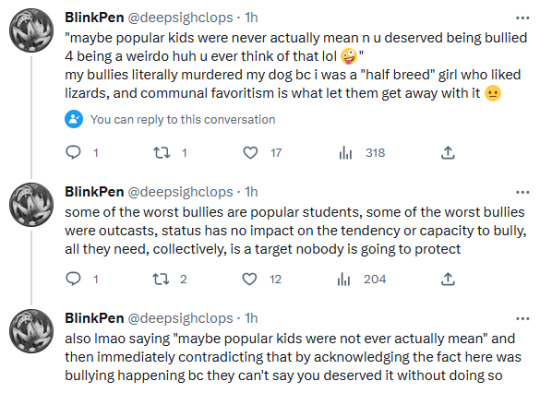
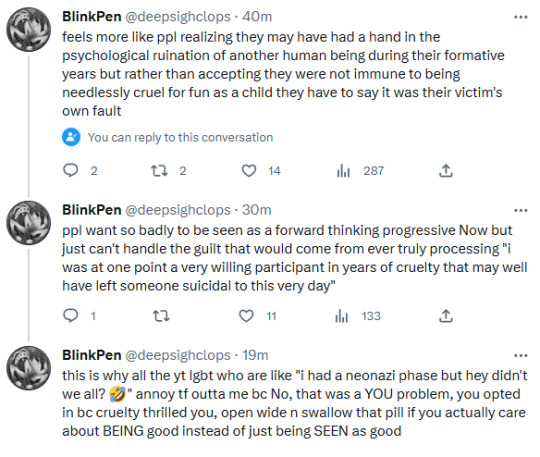
#as you can probably infer from the context#people were discussing if all popular kids are Like That or just written that way in media#which immediately swerved into 'yeah popular kids never did anything wrong people were just losers and maybe they deserved it'#and i'm not exaggerating when i say one the takes unironically claimed 'talking about frogs' was a worthy enough offense TO deserve it#you can see why i'd take issue with this entire conversation unfolding before my eyes
311 notes
·
View notes
Text
I love being nit-picky about canon until it's a character I hate. Then I love intentionally interpreting every single thing about them through the absolute worst lens possible. Because I hate them. And I love hating. Hope this helps.
#when I say 'hate'#I mean like. actually genuinely wish-did-not-exist#there are four (4) characters in everything I've ever read/watched who qualify for this#(okay we'll say four and a half because another character like. I don't think I hate the character I hate what they reflect about fictional#trends & what they inspired in fandom. but that's...not really on the CHARACTER you know. so I feel like saying 'I hate them' is not fair)#you can probably infer from context at least like. some of them.#(number one is raul ctrlz btw. I mean not that he needs ME giving him bad-faith interpretations he already does the work himself)#(like genuinely he's just like that. that being said I DO take delight in his suffering and not in a My Blorbo™ kind of way)#(you want to bring out the worst side of me show me a character within that particular archetype who is incredibly popular)#(I become a raging beast of a monster. my braincells take on lives of their own and become the embodiment of amorphous toxic ectoplasm)#(okay I really am just Saying Words at this point I'm going to go eat something because I haven't eaten anything today GOODBYE)
2 notes
·
View notes
Text
In recent posts I've complained that a lot of tabletop RPGs which toss around the term "fiction first" don't actually understand what it means, and I've been asked to expand on that complaint. So:
In my experience, there are two ways that game texts which want to position themselves as "fiction first" trip themselves up, one obvious and one subtle.
The first and more obvious pitfall is treating "fiction first" as an abstract ideology. They're using "fiction first" as a synonym for "story over rules" in a way that calls back to the role-playing-versus-roll-playing discourse of the early 2000s. The trouble is, now as then, nobody can usefully explain what "story over rules" actually entails. At best, they land on a definition of "fiction first" that talks about the GM's right to ignore the rules to better serve the story, which is no kind of definition at all – it's just putting a funny hat on the Rule Zero fallacy and trying to pass it off as some sort of totalising ideology of play.
A more useful way of defining "fiction first" play is to think of it not in terms of whether you engage with the rules at all, but in terms of when they're invoked: specifically, as a question of order of operations.
Suppose, for example, that you're playing Dungeons & Dragons, and you pick up the dice and say "I attack the dragon". Some critics would claim that no actual narrative has been established – that this is simply a bare invocation of game mechanics – but in fact we can infer a great deal: your character is going to approach the dragon, navigating any inclement terrain which lies between them, and attempt to kill the dragon using the weapon they're holding in their hand. The rules are so tightly bound to a particular set of narrative circumstances that simply invoking those rules lets us work backwards to determine what the context and stakes must be for that invocation of the rules to be sensical; this, broadly speaking, is what "rules first" looks like.
Conversely, let's say that your game of Dungeons & Dragons has confronted you with a pit blocking your path, and you want to make an Athletics check to cross it. At this point the GM is probably going to stop you and say, hold up, tell us what that looks like. Are you trying to jump across it? Are you trying to climb down one wall of the pit and up the other? Are you trying to tie a rope to the halfling and toss them to the other side? In other words, before you can pick up the dice, you need to have a little sidebar with the GM to hash out what the narrative context is, and to negotiate what can be achieved and what's at stake if you mess it up; this, broadly, is what "fiction first" looks like.
At this point I know some people are thinking "wait, hold on – both of those examples were from Dungeons & Dragons; are you saying that Dungeons & Dragons is both a rules-first game and a fiction-first game?" And yeah, I am. That's the second, more subtle place where game texts that talk about "fiction first" go astray: they talk about it as though being "fiction first" or "rules first" is something which is inherent to game systems as a whole.
This is not in fact true: being "fiction first" or "rules first" is something which describes particular invocations of the rules. In practice, only very simple games spend all of their time in one mode or the other; most will switch back and forth at need. Generally, most "traditional" RPGs (i.e., the direct descendants of Dungeons & Dragons and its various imitators) tend to operate in rules-first mode in combat and fiction-first mode out of it, though this is a simplification – when and how such mode-switching occurs can be quite complex.
Like any other design pattern, "fiction first" mechanics are a tool that's well suited for some jobs, and ill suited for others. Sometimes your rules are fine-grained enough that having an explicit negotiation and stakes-setting phase would just be adding extra steps. Sometimes you're using the outputs of the rules a narrative prompt, and having to pin the context down ahead of time would defeat the purpose. Fortunately, you don't have to commit yourself to one approach or the other; as long as your text is clear about how you're assuming a given set of rules toys will be used, you can switch modes as need dictates. However, you're not going to be capable of that kind of transparency if you're thinking in terms of "this a Fiction First™ game".
(Incidentally, this is why it can be hard to talk about "fiction first" with OSR fans if you're being dogmatic about fiction-first framing being an immutable feature of particular games. Since traditional RPGs tend to observe the above-described rules-first-in-combat, fiction-first-out-of-combat division, and OSR games tend to treat actually getting into a fight as a strategic failure state, a lot of OSR games spend most of their time in fiction-first mode. If you go up to an OSR fan and insist that D&D-style games can never be fiction-first, then attempt to define "fiction first" for them and proceed to describe how they usually play, they'll quite justifiably conclude that you have your head up your ass!)
#gaming#tabletop roleplaying#tabletop rpgs#game design#fiction first#violence mention#death mention#swearing
2K notes
·
View notes
Text
“Show, Don’t Tell”…But This Time Someone Explains It

If you’ve ever been on the hunt for writing advice, you've definitely seen the phrase “Show, Don’t Tell.”
Writeblr coughs up these three words on the daily; it’s often considered the “Golden Rule” of writing. However, many posts don't provide an in-depth explanation about what this "Golden Rule" means (This is most likely to save time, and under the assumption that viewers are already informed).
More dangerously, some posts fail to explain that “Show, Don’t Tell” occasionally doesn’t apply in certain contexts, toeing a dangerous line by issuing a blanket statement to every writing situation.
The thing to take away from this is: “Show, Don’t Tell” is an essential tool for more immersive writing, but don't feel like a bad writer if you can’t make it work in every scenario (or if you can’t get the hang of it!)
1. What Does "Show, Don't Tell" Even Mean?

“Show, Don’t Tell” is a writing technique in which the narrative or a character’s feelings are related through sensory details rather than exposition. Instead of telling the reader what is happening, the reader infers what is happening due to the clues they’ve been shown.
EXAMPLE 1:
Telling: The room was very cold.
Showing: She shivered as she stepped into the room, her breath steaming in the air.
EXAMPLE 2:
Telling: He was furious.
Showing: He grabbed the nearest book and hurled it against the wall, his teeth bared and his eyes blazing.
EXAMPLE 3 ("SHOW, DON'T TELL" DOESN'T HAVE TO MEAN "WRITE A LOT MORE")
Telling: The room hadn't been lived in for a very long time.
Showing: She shoved the door open with a spray of dust.
Although the “showing” sentences don’t explicitly state how the characters felt, you as the reader use context clues to form an interpretation; it provides information in an indirect way, rather than a direct one.
Because of this, “Show, Don’t Tell” is an incredibly immersive way to write; readers formulate conclusions alongside the characters, as if they were experiencing the story for themselves instead of spectating.
As you have probably guessed, “showing” can require a lot more words (as well as patience and effort). It’s a skill that has to be practiced and improved, so don’t feel discouraged if you have trouble getting it on the first try!
2. How Do I Use “Show, Don’t Tell” ?
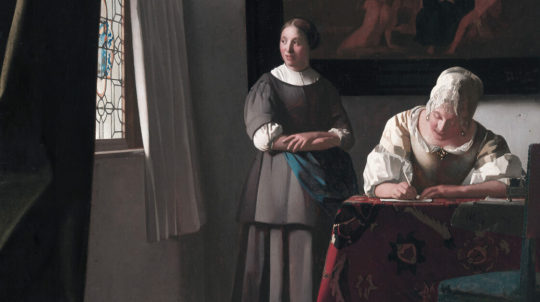
There are no foolproof parameters about where you “show” and not “tell" or vice versa; it’s more of a writing habit that you develop rather than something that you selectively decide to employ.
In actuality, most stories are a blend of both showing and telling, and more experienced writers instinctively switch between one and another to cater to their narrative needs. You need to find a good balance of both in order to create a narrative that is both immersive and engaging.
i. Help When Your Writing Feels Bare-Bones/Soulless/Boring
Your writing is just not what you’ve pictured in your head, no matter how much you do it over. Conversations are stilted. The characters are flat. The sentences don’t flow as well as they do in the books you've read. What’s missing?
It’s possibly because you’ve been “telling” your audience everything and not “showing”! If a reader's mind is not exercised (i.e. they're being "spoon-fed" all of the details), your writing may feel boring or uninspired!
Instead of saying that a room was old and dingy, maybe describe the peeling wallpaper. The cobwebs in the corners. The smell of dust and old mothballs. Write down what you see in your mind's eye, and allow your audience to formulate their own interpretations from that. (Scroll for a more in-depth explanation on HOW to develop this skill!)
ii. Add More Depth and Emotion to Your Scenes
Because "Show, Don't Tell" is a more immersive way of writing, a reader is going to feel the narrative beats of your story a lot more deeply when this rule is utilized.
Describing how a character has fallen to their knees sobbing and tearing our their hair is going to strike a reader's heart more than saying: "They were devastated."
Describing blood trickling through a character's fingers and staining their clothes will seem more dire than saying: "They were gravely wounded."
iii. Understand that Sometimes Telling Can Fit Your Story Better
Telling can be a great way to show your characters' personalities, especially when it comes to first-person or narrator-driven stories. Below, I've listed a few examples; however, this list isn't exclusive or comprehensive!
Initial Impressions and Character Opinions
If a character describes someone's outfit as "gaudy" or a room as "absolutely disgusting," it can pack more of a punch about their initial impression, rather than describing the way that they react (and can save you some words!).
In addition, it can provide some interesting juxtaposition (i.e. when a character describes a dog as "hideous" despite telling their friend it looks cute).
2. Tone and Reader Opinions
Piggybacking off of the first point, you can "tell, not show" when you want to be certain about how a reader is supposed to feel about something. "Showing" revolves around readers drawing their own conclusions, so if you want to make sure that every reader draws the same conclusion, "telling" can be more useful!
For example, if you describe a character's outfit as being a turquoise jacket with zebra-patterned pants, some readers may be like "Ok yeah a 2010 Justice-core girlie is slaying!" But if you want the outfit to come across as badly arranged, using a "telling" word like "ridiculous" or "gaudy" can help set the stage.
3. Pacing
"Show, don't tell" can often take more words; after all, describing a character's reaction is more complicated than stating how they're feeling. If your story calls for readers to be focused more on the action than the details, such as a fight or chase scene, sometimes "telling" can serve you better than "showing."
A lot of writers have dedicated themselves to the rule "tell action, show emotion," but don't feel like you have to restrict yourself to one or the other.
iv. ABOVE ALL ELSE: Getting Words on the Page is More Important!
If you’re stuck on a section of your story and just can’t find it in yourself to write poetic, flowing prose, getting words on the paper is more important than writing something that’s “good.” If you want to be able to come back and fix it later, put your writing in brackets that you can Ctrl + F later.
Keeping your momentum is the hardest part of writing. Don't sacrifice your inspiration in favor of following rules!
3. How Can I Get Better at “Show, Don’t Tell”?
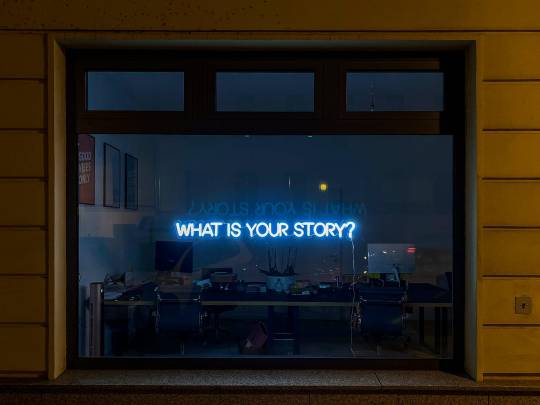
i. Use the Five Senses, and Immerse Yourself!
Imagine you’re the protagonist, standing in the scene that you have just created. Think of the setting. What are things about the space that you’d notice, if you were the one in your character’s shoes?
Smell? Hear? See? Touch? Taste?
Sight and sound are the senses that writers most often use, but don’t discount the importance of smell and taste! Smell is the most evocative sense, triggering memories and emotions the moment someone walks into the room and has registered what is going on inside—don’t take it for granted. And even if your character isn’t eating, there are some things that can be “tasted” in the air.
EXAMPLE:
TELLING: She walked into the room and felt disgusted. It smelled, and it was dirty and slightly creepy. She wished she could leave.
SHOWING: She shuffled into the room, wrinkling her nose as she stepped over a suspicious stain on the carpet. The blankets on the bed were moth-bitten and yellowed, and the flowery wallpaper had peeled in places to reveal a layer of blood-red paint beneath…like torn cuticles. The stench of cigarettes and mildew permeated the air.
“How long are we staying here again?” she asked, flinching as the door squealed shut.
The “showing” excerpt gives more of an idea about how the room looks, and how the protagonist perceives it. However, something briefer may be more suited for writers who are not looking to break the momentum in their story. (I.e. if the character was CHASED into this room and doesn’t have time to take in the details.)
ii. Study Movies and TV Shows: Think like a Storyteller, Not Just a Writer
Movies and TV shows quite literally HAVE TO "show, and not tell." This is because there is often no inner monologue or narrator telling the viewers what's happening. As a filmmaker, you need to use your limited time wisely, and make sure that the audience is engaged.
Think about how boring it would be if a movie consisted solely of a character monologuing about what they think and feel, rather than having the actor ACT what they feel.
(Tangent, but there’s also been controversy that this exposition/“telling” mindset in current screenwriting marks a downfall of media literacy. Examples include the new Percy Jackson and Avatar: The Last Airbender remakes that have been criticized for info-dumping dialogue instead of “showing.”)
If you find it easy to envision things in your head, imagine how your scene would look in a movie. What is the lighting like? What are the subtle expressions flitting across the actors' faces, letting you know just how they're feeling? Is there any droning background noise that sets the tone-- like traffic outside, rain, or an air conditioner?
How do the actors convey things that can't be experienced through a screen, like smell and taste?
Write exactly what you see in your mind's eye, instead of explaining it with a degree of separation to your readers.
iii. Listen to Music
I find that because music evokes emotion, it helps you write with more passion—feelings instead of facts! It’s also slightly distracting, so if you’re writing while caught up in the music, it might free you from the rigid boundaries you’ve put in place for yourself.
Here’s a link to my master list of instrumental writing playlists!
iv. Practice, Practice, Practice! And Take Inspiration from Others!
“Show Don’t Tell” is the core of an immersive scene, and requires tons of writing skills cultivated through repeated exposure. Like I said before, more experienced writers instinctively switch between showing and telling as they write— but it’s a muscle that needs to be constantly exercised!
If I haven’t written in a while and need to get back into the flow of things, I take a look at a writing prompt, and try cultivating a scene that is as immersive as possible! Working on your “Show, Don’t Tell” skills by practicing writing short, fun one-shots can be much less restrictive than a lengthier work.
In addition, get some inspiration and study from reading the works of others, whether it be a fanfiction or published novel!
If you need some extra help, feel free to check out my Master List of Writing Tips and Advice, which features links to all of my best posts, each of them categorized !
Hope this helped, and happy writing!
2K notes
·
View notes
Text
Honestly I'm pretty tired of supporting nostalgebraist-autoresponder. Going to wind down the project some time before the end of this year.
Posting this mainly to get the idea out there, I guess.
This project has taken an immense amount of effort from me over the years, and still does, even when it's just in maintenance mode.
Today some mysterious system update (or something) made the model no longer fit on the GPU I normally use for it, despite all the same code and settings on my end.
This exact kind of thing happened once before this year, and I eventually figured it out, but I haven't figured this one out yet. This problem consumed several hours of what was meant to be a relaxing Sunday. Based on past experience, getting to the bottom of the issue would take many more hours.
My options in the short term are to
A. spend (even) more money per unit time, by renting a more powerful GPU to do the same damn thing I know the less powerful one can do (it was doing it this morning!), or
B. silently reduce the context window length by a large amount (and thus the "smartness" of the output, to some degree) to allow the model to fit on the old GPU.
Things like this happen all the time, behind the scenes.
I don't want to be doing this for another year, much less several years. I don't want to be doing it at all.
----
In 2019 and 2020, it was fun to make a GPT-2 autoresponder bot.
[EDIT: I've seen several people misread the previous line and infer that nostalgebraist-autoresponder is still using GPT-2. She isn't, and hasn't been for a long time. Her latest model is a finetuned LLaMA-13B.]
Hardly anyone else was doing anything like it. I wasn't the most qualified person in the world to do it, and I didn't do the best possible job, but who cares? I learned a lot, and the really competent tech bros of 2019 were off doing something else.
And it was fun to watch the bot "pretend to be me" while interacting (mostly) with my actual group of tumblr mutuals.
In 2023, everyone and their grandmother is making some kind of "gen AI" app. They are helped along by a dizzying array of tools, cranked out by hyper-competent tech bros with apparently infinite reserves of free time.
There are so many of these tools and demos. Every week it seems like there are a hundred more; it feels like every day I wake up and am expected to be familiar with a hundred more vaguely nostalgebraist-autoresponder-shaped things.
And every one of them is vastly better-engineered than my own hacky efforts. They build on each other, and reap the accelerating returns.
I've tended to do everything first, ahead of the curve, in my own way. This is what I like doing. Going out into unexplored wilderness, not really knowing what I'm doing, without any maps.
Later, hundreds of others with go to the same place. They'll make maps, and share them. They'll go there again and again, learning to make the expeditions systematically. They'll make an optimized industrial process of it. Meanwhile, I'll be locked in to my own cottage-industry mode of production.
Being the first to do something means you end up eventually being the worst.
----
I had a GPT chatbot in 2019, before GPT-3 existed. I don't think Huggingface Transformers existed, either. I used the primitive tools that were available at the time, and built on them in my own way. These days, it is almost trivial to do the things I did, much better, with standardized tools.
I had a denoising diffusion image generator in 2021, before DALLE-2 or Stable Diffusion or Huggingface Diffusers. I used the primitive tools that were available at the time, and built on them in my own way. These days, it is almost trivial to do the things I did, much better, with standardized tools.
Earlier this year, I was (probably) one the first people to finetune LLaMA. I manually strapped LoRA and 8-bit quantization onto the original codebase, figuring out everything the hard way. It was fun.
Just a few months later, and your grandmother is probably running LLaMA on her toaster as we speak. My homegrown methods look hopelessly antiquated. I think everyone's doing 4-bit quantization now?
(Are they? I can't keep track anymore -- the hyper-competent tech bros are too damn fast. A few months from now the thing will be probably be quantized to -1 bits, somehow. It'll be running in your phone's browser. And it'll be using RLHF, except no, it'll be using some successor to RLHF that everyone's hyping up at the time...)
"You have a GPT chatbot?" someone will ask me. "I assume you're using AutoLangGPTLayerPrompt?"
No, no, I'm not. I'm trying to debug obscure CUDA issues on a Sunday so my bot can carry on talking to a thousand strangers, every one of whom is asking it something like "PENIS PENIS PENIS."
Only I am capable of unplugging the blockage and giving the "PENIS PENIS PENIS" askers the responses they crave. ("Which is ... what, exactly?", one might justly wonder.) No one else would fully understand the nature of the bug. It is special to my own bizarre, antiquated, homegrown system.
I must have one of the longest-running GPT chatbots in existence, by now. Possibly the longest-running one?
I like doing new things. I like hacking through uncharted wilderness. The world of GPT chatbots has long since ceased to provide this kind of value to me.
I want to cede this ground to the LLaMA techbros and the prompt engineers. It is not my wilderness anymore.
I miss wilderness. Maybe I will find a new patch of it, in some new place, that no one cares about yet.
----
Even in 2023, there isn't really anything else out there quite like Frank. But there could be.
If you want to develop some sort of Frank-like thing, there has never been a better time than now. Everyone and their grandmother is doing it.
"But -- but how, exactly?"
Don't ask me. I don't know. This isn't my area anymore.
There has never been a better time to make a GPT chatbot -- for everyone except me, that is.
Ask the techbros, the prompt engineers, the grandmas running OpenChatGPT on their ironing boards. They are doing what I did, faster and easier and better, in their sleep. Ask them.
5K notes
·
View notes
Note
Hi! I was wondering if you could help me out with a word I've forgotten? I'm trying to remember the name for a concept that (I think) talks about how people better understand or process Things once they have vocabulary to describe it - I've heard it talked about in regards to the colour orange, or coercive control, etc.
long story short i've just read a paper saying ancient Greeks and Romans weren't racist bc they had no word for racism and am trying to form an argument against!
(no worries if this is unanswerable, i'm aware its a bit of a long shot but you struck me as a person who Knows Things)
That’s extremely kind and funny of you. i don’t know much but i am ok at synthesis.
I think you might be thinking of the concepts loosely called the “Sapir-Whorf hypothesis”, which describes something called “linguistic determinism.” This idea has been “disproven”, as it is just too reductionist as a concept - people are clearly perfectly capable of having experiences that are tough to describe with words. There will be plenty of papers showing how this reasoning is applied.
but it is still commonly thrown around and still considered a useful teaching framework. That’s why you’ll see it referenced online as if it is fresh, new, and applicable - people learn about it every year in college. Also, elements of the framework are probably perfectly sound. It definitely seems to be the case that language shapes brains; it just doesn’t seem to be the case that humans who don’t have specific words for them can’t experience orange, or the future.
(Many things in college are taught using teaching frameworks that may not be, technically, true; the framework is intended to give a critical structure for interpreting information. Then, when we later find evidence that disproves the hypothesis, that single piece of information doesn’t destroy our expensive college education; what we paid for is the framework. This is mostly frustrating in the sciences, when fresh crops of undergraduate students crash around on social media, grappling with their first exposure to (complex concept) and how it’s DIFFERENT to what they learned BEFORE and their teachers LIED TO EVERYBODY and they’re going to save the world from POP SCIENCE by telling the TRUTH. You’ll notice that these TOTALLY NEW INFORMATION reveals map along the semester schedule. The thing here is that getting new information, or information being different from what you were previously told, does not cancel out the fact that you are getting what you pay for - an education. Learning new facts that change our relationships to hypotheses isn’t a ✨huge betrayal ✨ , but the expected process of academia. Anyway.)
You have an interesting response here, and can start by looking at the ways that Sapir-Whorf has been disproved. There will be loads of literature on that.
However, it would be interesting to look at the argument as an unpicking of the other side’s rather weird, ritualistic superstitious belief that a behavior doesn’t exist if the creatures doing it can’t describe it. It is not on the ancient Greeks and Romans to categorise and interpret their behavior for a modern educated audience. They do not have the wherewithal to do so. They are also fucking dead. We can name the behaviors we see, and describe their impacts, however the hell we like.
Sure, the ancient Greeks used “cancer” to refer to lumpy veiny tumors. We can infer that they still had blood cancer, because their medical texts describe leukaemia and their corpses have evidence of it - they just didn’t know it was cancer. But we do, so we can call it cancer. Just because Homer said “the wine-dark sea” in a flight of girlish whimsy doesn’t mean he was unable to distinguish grape juice from saltwater, which we know, because we can observe that he was an intelligent wordsmith perfectly capable of talking about wine and oceans in other contexts. We are the people who get to stand at our point of history with our words, and name things like “this person probably died of leukaemia” and “poets say things that aren’t necessarily literal” and “this behaviour was racist” and “that’s gay” and “togas kinda slay tho” despite Ancient Greeks having different concepts of cancer, wittiness, prejudice, homosexuality, and slaying than we do today.
Now just to caveat that people do get muddled about the concept of racism. Our understanding of racism from here - this point of history, with these words, probably from the West - is heavily influenced by how we see racism around us today: white supremacy and the construct of “whiteness,” European colonial expansion, transatlantic chattel slavery, orientalism, evangelism, 20th century racial science, and so on. This is the picture of racism that really dominates our current discourse, so people often mistake it for the definition of racism. (Perhaps in a linguistic-deterministic sort of way after all.) As a result, muddled-up people often say things like “I can’t be racist because I’m not a white American who throws slurs at black American people,” while being an Indian person in the UK who votes for vile anti-immigration practices, or a Polish person with a horrible attitude about the Roma. Many people genuinely hold this very kindergarten idea of racism; if your opponent does as well, they’re probably thinking something like “Ancient Greek and Roman people didn’t have a concept of white supremacy, because whiteness hadn’t been invented yet, so how could they be racist?” And that’s unsound reasoning in a separate sense.
Racism as the practice of prejudice against an ethnicity, particularly one that is a minority, is a power differential that is perfectly observable in ancient cultures. The beliefs and behaviors will be preserved in written plays, recorded slurs, beauty standards, reactions to foreign marriages, and travel writing. The impacts will be documented in political records, trade agreements, the layouts of historical districts of ancient towns.
You don’t need permission to point out behaviours and impacts. You can point them out in any words you like. You can make up entirely new words to bully the ancient romans with. You are the one at this point of history and your words are the ones that get used.
Pretending that “words” are some kind of an intellect-obscuring magical cloud in the face of actual evidence is just a piece of sophistry (derogatory) on the part of your opponent here. It’s meant to be a distraction. You can dismiss this very flimsy shield pretty quickly and get them in the soft meat of them never reading anything about the actual material topic, while they’re still looking up dictionary definitions or whatever.
605 notes
·
View notes
Text
Neil's picks for Aziraphale & Crowley's Angelic Playlist were Cry Me a River (Julie London), The Book of Love (Peter Gabriel), and The Show Must Go On (Queen).
Three songs. Two about the aftermath of a break up, and one about coming together in love. So very clearly, we can infer a Crowley POV song, an Aziraphale POV song, and a song for the two of them and their happily ever after. (Song lyrics for all three after the cut for reference.)
The Book of Love is a perfect wedding song. It's a song to play under two people declaring their desire to spend eternity together. With lines about dancing and reading and it's perfect. It's originally a Magnetic Fields song that was released in 1999. Peter Gabriel recorded a cover in 2004 for the movie Shall We Dance about which I know nothing but the Wikipedia summary. But since we know how movies are important here... It's a standard rom-com with a bored Richard Gere secretly taking up ballroom dancing after following a pretty lady from the train (J-Lo). His wife (Susan Sarandon) thinks he's cheating, turns out nope, just dancing, drama ensues, he gives up dancing but eventually his wife becomes supportive and he realizes he loves his wife. And dancing. And they live happily ever after, with both of them getting what they want. Maybe we can draw some parallels here? But I think the song speaks for itself better than its connection with what sounds like a standard early 2000s romcom.
The individual songs are where it gets interesting.
Cry Me a River was first released by Julie London in 1951, but became popular after she sang it in the 1956 film The Girl Can't Help It starring Jayne Mansfield as an aspiring rock 'n roll singer. Again, relying on Wikipedia here, but there is an interesting bit about a blossoming forbidden relationship, wiretapped phones, and someone editing the recordings to keep the love affair secret. But again, it's probably a stretch to look too deeply into the movie.
The song has a very classic jazz feel. It's from a decade and a half later, but if you were, say, an angel who enjoyed Moonlight Serenade or A Nightingale Sang in Berkley Square, it has a similar feel. You definitely wouldn't say it's bebop. The lyrics are about someone who was in love and had their heartbroken. Their former love (who never shed a tear over the break up) has returned and wants to make up. The singer essentially says "you love me? Prove it. Cry me a river like I cried when you left." Which, fair, but in our context, ouch.
The Show Must Go On is a Queen song, and we know how much Queen we hear in association with Crowley in particular. But this just isn't any Queen song. It was written by Brian May about Freddie Mercury's struggles as he neared the end of his life, and it was recorded in 1990. (Coincidentally or not, the year Good Omens was published, a book co-created by friends, one of whom would die too soon, and the other of whom would reflect on his friend's end of life struggles as the story was told more fully. Yes, I'm crying about this.)
In the song, the singer is fighting to reach a place of freedom, away from empty spaces and heartbreak. They are fighting with pure will, and even though their heart is breaking they smile and carry on because the show must go on.
What I really appreciate here with the POV songs, is that they are cross-coded. Queen is Crowley-coded, but the song about someone fighting through heartbreak to achieve something vital, while forcing a smile for the audience? That's absolutely Aziraphale in Heaven. And the 40s/50s jazz ballad is absolutely Aziraphale's style, but the jilted lover who may be willing to give their love a second chance but needs to see proof that the lover cares as much as they do is Crowley all the way.
It's almost like... Well it's almost like even in their separation, they are each carrying a piece of the other. The book of love has music in it, indeed.
The Book of Love
The book of love is long and boring
No one can lift the damn thing
It's full of charts and facts, and figures
And instructions for dancing
But I
I love it when you read to me.
And you
You can read me anything.
The book of love has music in it
In fact that's where music comes from
Some of it's just transcendental
Some of it's just really dumb
But I
I love it when you sing to me
And you
You can sing me anything
The book of love is long and boring
And written very long ago
It's full of flowers and heart-shaped boxes
And things we're all too young to know
But I
I love it when you give me things
And you
You ought to give me wedding rings
Cry Me a River
Now you say you're lonely
You cry the whole night thorough
Well, you can cry me a river, cry me a river
I cried a river over you
Now you say you're sorry
For bein' so untrue
Well, you can cry me a river, cry me a river
I cried a river over you
You drove me, nearly drove me out of my head
While you never shed a tear
Remember, I remember all that you said
Told me love was too plebeian
Told me you were through with me and
Now you say you love me
Well, just to prove you do
Come on and cry me a river, cry me a river
I cried a river over you
The Show Must Go On
Empty spaces, what are we living for?
Abandoned places, I guess we know the score, on and on
Does anybody know what we are looking for?
Another hero, another mindless crime
Behind the curtain, in the pantomime
Hold the line
Does anybody want to take it anymore?
The show must go on
The show must go on, yeah
Inside my heart is breaking
My makeup may be flaking
But my smile, still, stays on
Whatever happens, I'll leave it all to chance
Another heartache, another failed romance, on and on
Does anybody know what we are living for?
I guess I'm learning
I must be warmer now
I'll soon be turning, round the corner now
Outside the dawn is breaking
But inside in the dark I'm aching to be free
The show must go on
The show must go on
Inside my heart is breaking
My makeup may be flaking
But my smile, still, stays on
My soul is painted like the wings of butterflies
Fairy tales of yesterday, grow but never die
I can fly, my friends
The show must go on
The show must go on
I'll face it with a grin
I'm never giving in
On with the show
I'll top the bill
I'll overkill
I have to find the will to carry on
On with the show
Show
Show must go on, go on, go on, go on, go on, go on, go on, go on
#ineffable playlist#good omens#good omens meta#ineffable lovers#ineffable divorce#queen#peter gabriel#julie london#neil gaiman#terry pratchett
285 notes
·
View notes
Text
There’s probably a million and one posts about Joker and Akechi being each other’s opposites or being the same once you get down to it (neglected kid, wanting to find recognition and purpose, etc.) but I’d like to talk about their views on food.
Akechi runs a food blog, as mentioned in Mementos Mission. He reviews places. Stuff like that, although while they do have a lot of fluff in them, are generally analytical in that it’s dissecting the food in regard to why it’s good and why you should try it. Considering the nature of it, it’s probably also meant to be an extension of his Detective Prince shtick, so whether or not he actually enjoys doing this is up in the air.
Then on the flip side, we have Joker who lives above a cafe. His guardian teaches him how to make coffee and curry, which he then can make as he pleases and serve to his friends. Like Akechi, you do get the prompts of what types of coffee are good or what ingredients go into curry to get specific flavours (much like a food blog would note), but unlike Akechi there’s a more personal connection to it as Sojiro teaches him.
Food in Persona 5 is a love language. Joker makes food for his friends. Sojiro makes Wakaba’s curry recipe for the shop and makes her favourite coffee on the anniversary of her death. The Thieves go out to celebrate a change of heart by having an outing. You both unlock Ryuji’s confidant and turn it into a blood oath while you’re out for food. Food literally heals you and regenerates your stamina in this game. Food is important.
Joker embraces the idea of food being important. The game takes time to educate you the player on little tidbits about the food he makes. It takes care into the segments you spend making Joker make food, again hitting you over the head with the fact that it’s important. So it’s kinda neat that you have Joker taking a very enthusiastic approach to food vs Akechi having a very sterile, clinical view of it - something meant for appearance and popularity only. Not bashing on food blogs, but in the context of the game, Akechi does not approach food in the same way Joker does. He’s distant from it, detached from it. We don’t have the sort of insight of Akechi that we do for Joker, but we can infer that he doesn’t have the same sense of emotional intelligence around it. And it fits his character, too. He’s had no one to take care of him in a long time and no one that depends on him. He doesn’t have a Sojiro to help teach him how to cook, and no one to share the benefits of it with.
I just find it interesting how even little details that aren’t even in the game add to how different these two are.
#crow grumbles#character analysis#persona 5#goro akechi#persona 5 protagonist#akira kurusu#ren amamiya#shuake#akeshu
560 notes
·
View notes
Text
I do think the "you know what he did when I told him I loved him?" exchange is a bit jarring from a writing perspective BUT I am putting my Watsonian hat on to darn this plot hole and I am thinking that Stede didn't know know, he just put it together from context right then and there.
like, Stede definitely knows Ed shot Izzy in the leg. even people who weren't there, like Lucius, know that Ed is responsible for maiming Izzy, and I would imagine that this was an important point in the discussion/vote over whether Ed should be banished or not. there's no way for him not to know if he's talked to the crew about Ed at all, and we know he has because we see the start of that conversation.
nor is it a surprise to him that Izzy loves Ed. outside of Ed saying Izzy's jealous and Stede asking if he's doing a victory lap, I think Stede lowkey thought Ed and Izzy were in a relationship in Season 1, due to comments like "trouble in paradise?" in 1x06.
and the question comes literally just after Izzy sits down to rest his leg, and Stede outright mentions the leg (bitchily) so the setup is very clear.
like, okay, if I spent several hours talking about the weird black comedy surrounding my college roommate's death and funeral, and then later in the conversation we started talking about regional restaurants, and I was like, "hey, you know when I was last in a Waffle House?", you can probably infer from the way I'm saying it and the context of the previous conversation that the answer is probably "after your college roommate's funeral." it'd be really weird if I said it that way and the answer was like, "last week, it was super uneventful and I go there all the time" or "when I was two years old, I don't remember it at all."
so yeah, I don't think there needed to have been an explicit conversation about it for Stede to infer it.
135 notes
·
View notes
Text
I know it’s been said but I find it so weird when people demonise Dora. The one interaction that we get with her- the REAL her- in the whole game, she is extremely patient, despite the fact that Harry is calling her in the middle of the night and asking creepo shit like ‘are you sleeping naked’. We can infer through context clues that this has probably happened multiple times before, and yet she still knows no signs of ill-will towards Harry- she just seems tired and concerned.
And it would be completely within her right to be angry at him for harassing her, as well! Knowing how volatile Harry can be, perhaps she even learned through fear not to confront him. And yet, there still seems to be this perception that, out of the both of them, DORA was the abusive one, despite all evidence pointing to the contrary! It’s not even that I don’t think she wasn’t at least slightly abusive, given Harry’s disabilities and their class differences, but what I am saying is that it was likely mutual, and that, out of the two of them, Harry was worse.
Their relationship probably got horrible and toxic towards the end, of that I have no doubt. What I don’t get is why the fandom seems to believe that Harry, as he currently is, is in any way capable of viewing the relationship objectively. There’s ample evidence that he was violent, frequently misogynistic, and that the experience gap between him and Dora was significant, and yet people still take his worst thoughts at face value. That she’s a ‘war criminal’, that’s she’s a goddess- people seem to think Harry’s deification of her is the main issue, and not the opposite; his virulent hatred towards Dora, towards ‘Revacholian women’.
It just boggles me that people are so willing to believe that Harry was the only one truly hurt- that Dora’s decision to leave was made lightly. We don’t know exactly what happened, and what glimpses we do get are filtered horribly through Harry’s grief, but they were in a relationship for more than a decade! They were planning to get married! I don’t think Dora just up and left for Mirova one day- the way the dream conversation goes seems to suggest they hadn’t been together for a while.
There are so, so many things said during the final dream that are probably just Harry’s self-hatred masquerading as Dora/Dolores- and while I wouldn’t be surprised if a lot of it did come from Dora, at other points in their relationship, I think it’s pretty obvious that the final dream is meant to be a confused muddle of Harry’s memories and grief. Why else would she appear as Dolores Dei? But, while no one ever explicitly says it, I feel like a lot of people want to believe that the way things are during the last dream is how they were in real life. That Dora really was cold and cruel to Harry- when in real life she appears as just the opposite, despite what he puts her through.
#and I know the answer as to why people do this is misogyny and also that we simply don’t get to know her very well on her own#and trust me I am well aware that Harry was also hurt badly by Dora. I am in no way trying to villainise him here#their relationship is obviously very complex and multifaceted with both sides being wrong at different points which is extremely realistic#that’s why I love it so much. what I don’t understand is why people will shelve these discussions in favour of woobifying harry#and once again I know the answer is just misogyny and that fandom hates complex female characters#ESPECIALLY if they’ve hurt a male character in some way. but the amount of flat surface level takes I’ve seen about these two…#let’s try and do a bit better instead of just boiling shit down to ‘Harry bad’ or ‘Dora bad’ yeah?#harry du bois#dora ingerlund#harrydora#dolores dei#disco elysium#de meta
72 notes
·
View notes
Note
What if Rollo, Fellow Honest and Gidel found out the 7 Overblots? How would they each react?



I’ll keep this short and sweet (since this is something I’ve joked about quite frequently, at least with one of the characters mentioned). If you’re a long time reader, you know exactly which one I mean 😂
Rollo would for sure feel validated about his anti-magic stance and double down on his original takes. I mean, he literally said the NRCs students are monsters/villains that he knows “will one day bring about a great disaster”, and the history of them OBing just proves his point. Those with too much magic can easily abuse their power and become arrogant and blind to their own faults, as is the case with the OBs 💀
Fellow does not strike me as the type to get worked up about others’ woes when he has himself to prioritize and worry about. This is even more true than ever considering how his event ended… Man’s literally out of a job and on the run for his life. I see Fellow just going, “Damn, sucks to suck” or “That’s rough, buddy” (a la Prince Zuko) as a reaction before skedaddling. You just told him a bunch of NRC students Overblotted, right? So you’re confirming that you’re a dangerous bunch 😂 and it’s probably safer for him to keep himself and Gidel at a distance. Self preservation and all, according to his street smarts. I don’t know if Fellow would want to empathize with the OB boys either, since they’re basically all from privileged backgrounds/families and may be fixated on that rather than their valid feelings or struggles. He wouldn’t be able to relate to most of their “first world problems”, for lack of a better term.
I don’t really have a strong gauge for Gidel’s reaction since we only have facial expressions and animations rather than dialogue to infer how he feels about things. I’m under the impression that because he’s young and doesn’t appear to be educated, maybe he doesn’t even fully grasp what an OB is or what causes it, or no one ever told him. I think he might be able to understand that it’s something bad through context clues and offer some clumsy sympathy though. Maybe a head pat or some small physical gesture to show he’s listening or he cares.
#twst#twisted wonderland#Fellow Honest#Rollo Flamme#Gidel#disney twisted wonderland#disney twst#notes from the writing raven#question#spoilers#Prince Zuko#ATLA#Avatar the Last Airbender
70 notes
·
View notes
Text
Scully the ice queen?
I often see people talking about the “ice queen” trope in XF fanfic from the 90s as an example of fanon becoming ubiquitous in fanfic. If you don't know what I'm talking about, this is it in a nutshell: basically, fanfic in the 1990s began to make reference to Scully as a perceived “ice queen,” both at work and in her personal life, meaning that she didn’t express her emotions, that she was repressed and cold. And then that became a thing, a standard trope that other fanfic writers drew on.
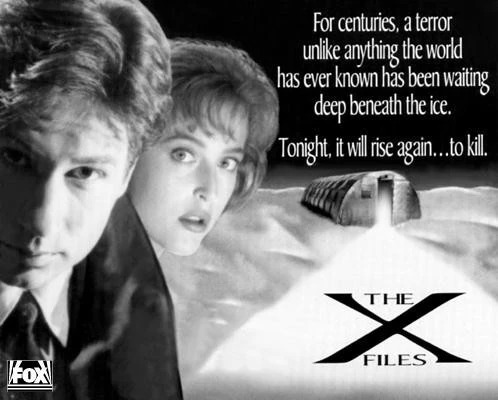
My theory is that the “ice queen” / Scully association didn’t actually come from specific works of fic or from specific individuals. I also don’t think it necessarily originated in fic and then crossed over into fan perceptions of Scully. I think it’s easy for 21st century fans to get the causal arrows mixed up on this because we're missing some historical context. I believe many viewers in the 1990s—not just fanfic writers—actually interpreted Scully differently than viewers now because they interpreted female characters differently. I think people in the 1990s were simply much more likely to interpret women serious about their professional lives as “ice queens.” Especially if their professional lives involved science.

Consider the below female scientist (P.K. Newby) writing about her graduate school experience in the 1990s.

Of course this still happens today, and of course it didn’t always happen in the 1990s. But I think it’s important that this impacted actual women living their lives in the same time period, because it’s reasonable that this also affected TV audiences’ perception of a character.
I give you this message from the Usenet discussion group alt.tv.x-files, the first season of the show, from before the fanfic Usenet group was even created. This user characterizes Scully as an “ice queen,” claiming to notice a change after Darkness Falls, and even associating it with her skepticism specifically.

(This is me showing you the whole message with the date, then showing you parts close up because it's so tiny. I'm very dedicated.)


So in this (very early online fandom) conversation, we have a fan who already read her as an “ice queen” on their own without the filter of fanfic to sway them.
Now please don’t get me wrong. Fanfic definitely took hold of the Scully / ice queen thing and ran with it. There are many examples in the Usenet group during the 1990s of people asking, “Hey, which episode was Scully called ‘ice queen’ again? and people saying, ‘Oh never, ha, that’s just a fanfic thing.’” It was a well-established trope by at least 1997. See below.
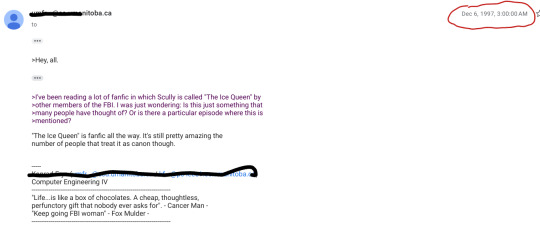


I just want people to consider that it didn’t have to be one writer, one fic, or one incident that led to the popularization of this piece of fanon. This would have been something people understood right away because it already was culturally out there in the interpretation of the character and in associations with professional women. And like the person asking the question in the above message infers, it probably did come organically from several people at once.
That said, some 1990s fans actively questioned it, observing it didn’t seem to fit with their interpretation of the show.

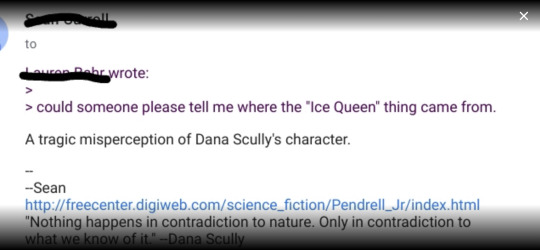

Notice that in the below conversation, Scully as ice queen is mixed up in perceptions of GA as ice queen, too.
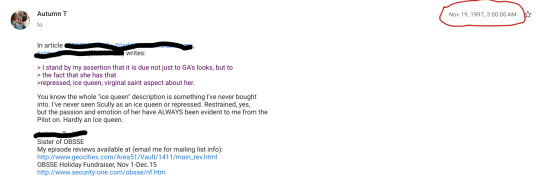
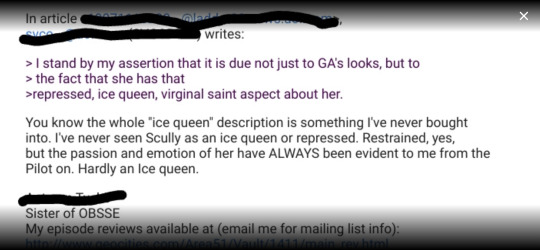

(Side note: I mean, you can totally get where that person was coming from, right? Gillian Anderson was TOTALLY giving repressed, cold, virginal saint in 1997.)
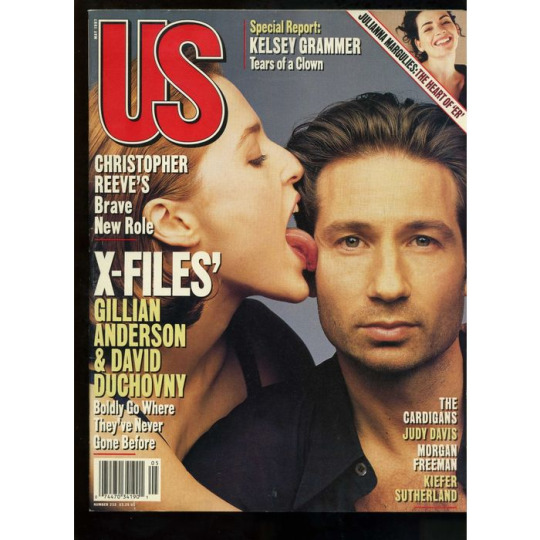
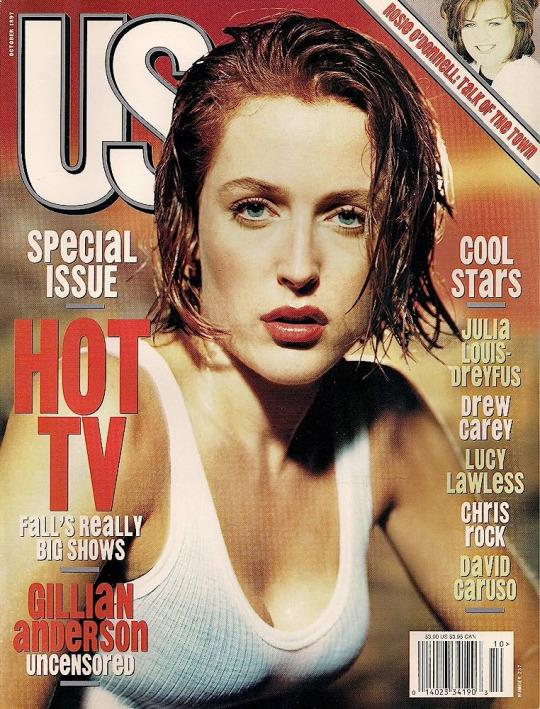
As a prolific reader of fanfic, old and new, I think it’s also important to add this: it seems to me that fanfic writers more often made “Ice Queen” a hurtful nickname that Scully was called by other people (like Mulder being called “Spooky”), not an actual characterization of her personality. And actually, especially given her mostly-male workplace, this seems not unrealistic in the 1990s? Some fanfic writers may even have been writing from experience. (At least, I think I'm right in saying that tendency was true. I'd be curious to know if other readers of old fanfic think Scully herself is characterized as an "ice queen" more often than I'm saying.)
I’m an Old Person. I’m ashamed to admit that in the same time period, I had a high school friend who always studied really hard in school and prioritized grades over social life, and sometimes we jokingly called her an “ice queen.” There was no male equivalent term. So unfortunately, I know this was most definitely a thing outside of Scully and the XF fandom. Fortunately, it does seem to be something we see less of in the 2020s. (At least I think?) I just want to point it out because it’s one of those things you could think was just a little fanon quirk concerning this character or this show when really I do think it’s about gender perceptions overall.
Very interested to know, though, if others think I'm wrong.

(actual Ice queen)
#the x files#ice queen#dana scully#gillian anderson#90s culture#xfiles fanfic#tropes#x files meta#txf meta#fanon
188 notes
·
View notes
Note
Hello! It's me again. Thank you for answering my last ask.
I went and found some more voice lines. Sadly, I cannot screenshot the audio, but here's the English translations of the lines from Jack's dorm uniform, Rook's Halloween costume, Malleus' GloMas outfit, Kalim's New Year getup, Silver's Halloween costume, and Silver's Birthday Boy clothes. It's worth noting that Deuce calls Kalim "Asim-senpai" in the New Year's duo.
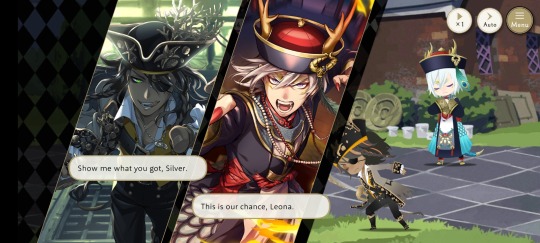
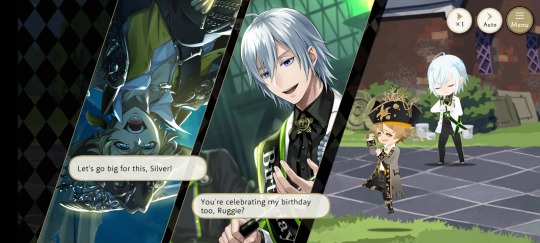
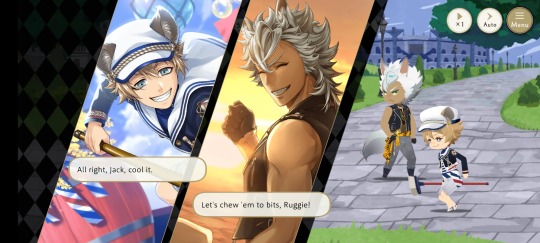
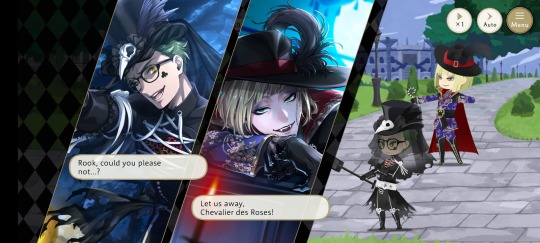
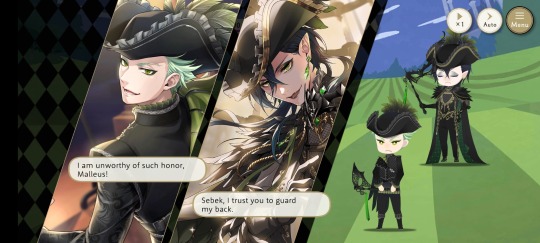
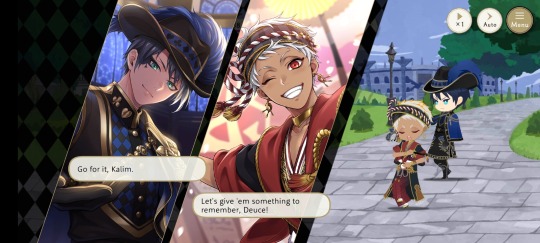
Hope this helps! (I only have the Jack, Malleus, and Rook shown here, the rest I got via the helper cards in Crafter's Gauntlet battles. lol.)
Hello hello, thank you so much!! I checked the audio on all of the above cards and with the exception of the usual removal of honorifics, the official translations on EN are all perfect! :>
Have put together an original dialogue/literal translation comparison just for fun, but they're all great as they are!
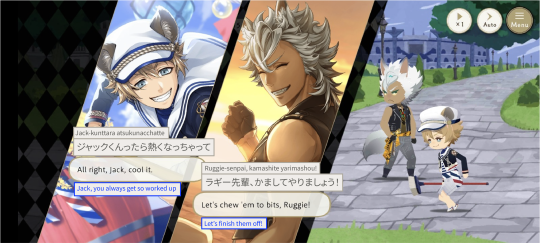
Jack's phrasing here is probably meant to be a wolf-based pun, as the word he is using (かます) both means to defeat a person/win a challenge in one go, and is also pronounced the same as the word 嚙ます, for "to bite."
So technically he is saying both "let's bite them" and "let's finish them off" simultaneously, which isn't really something that can be portrayed in English.
Ruggie's response of "熱くなっちゃって" is kind of Ruggie saying, "You always get so heated!" or "passionate" or "worked up."
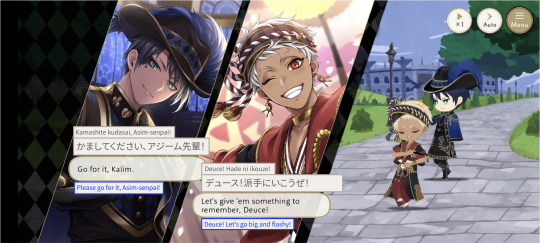
The word "hade" (派手) comes up a lot with Kalim, but can be so difficult to express in English. It can be said as "flashy," "gaudy," etc. Basically, to go very big!
Deuce's response is the same on EN and is a word of encouragement (it is actually かます again, from Jack's Duo, as Deuce is encouraging Kalim to take out their opponent), but Deuce is also saying "please."
And then there is Deuce's use of last-name-senpai being changed to a first name without an honorific which, as you say, is worthy of note!
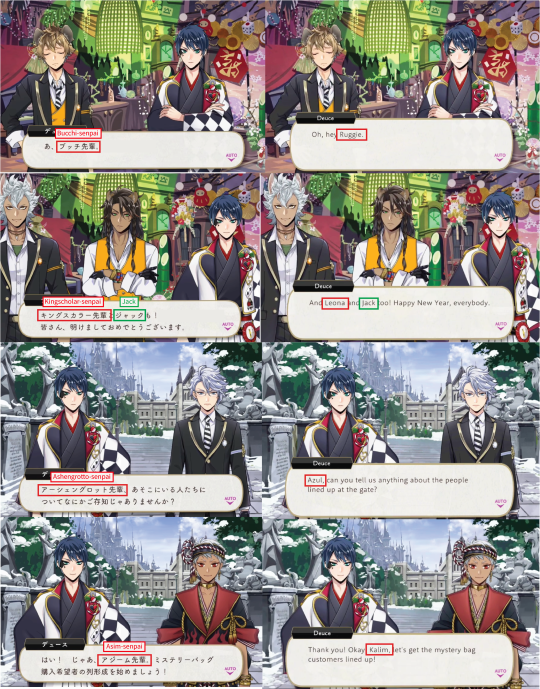
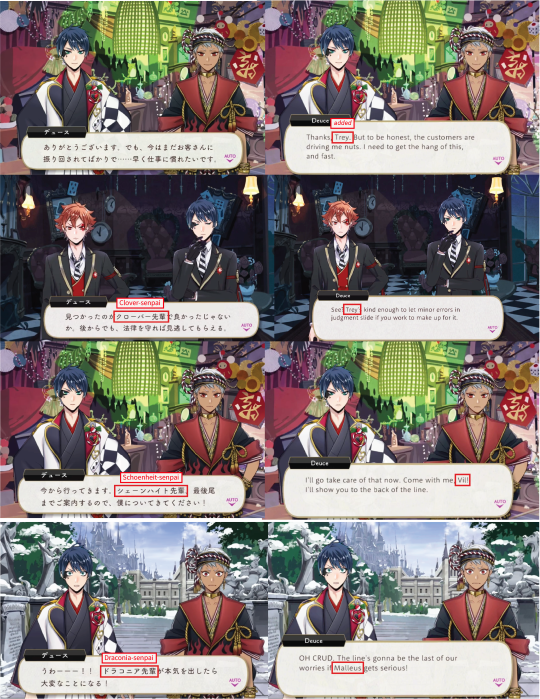
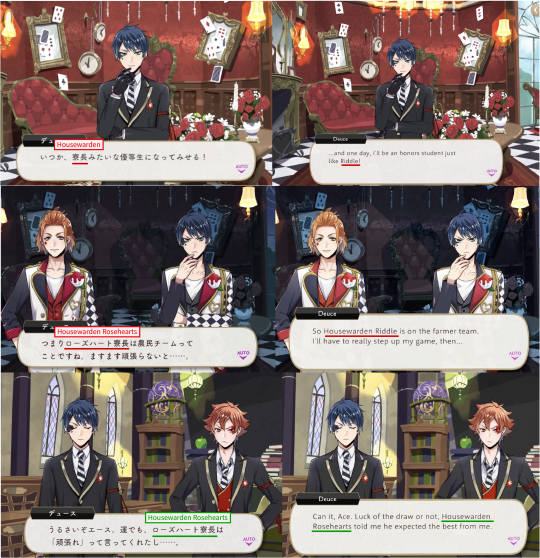
Deuce's way of expressing himself connects directly to his past violence and his present-day efforts to reform himself; an important part of the character that might just be impossible to translate into english. (More here!)
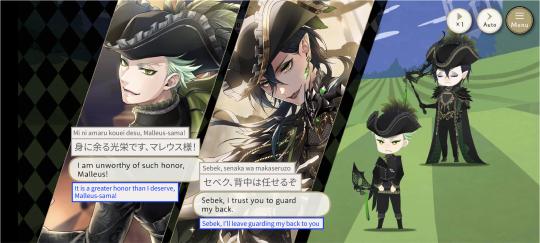
Malleus and Sebek's lines are both perfectly accurate on EN, although "-sama" has been removed from Sebek's dialogue.
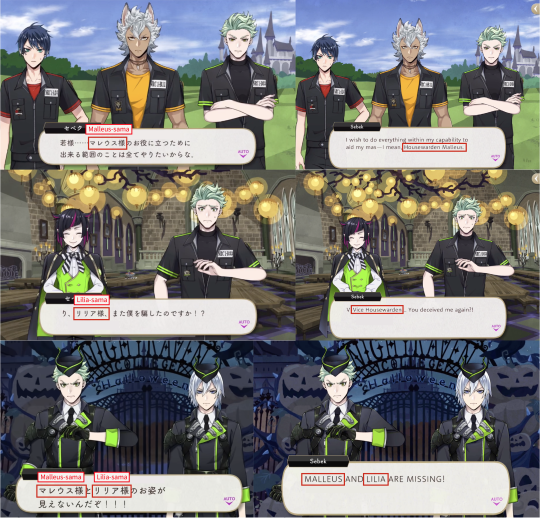
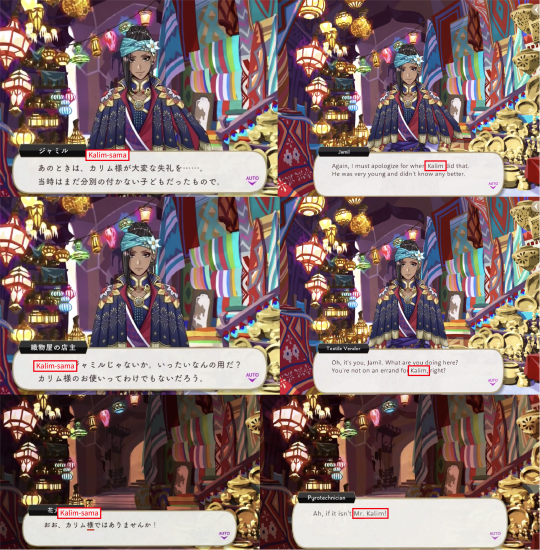
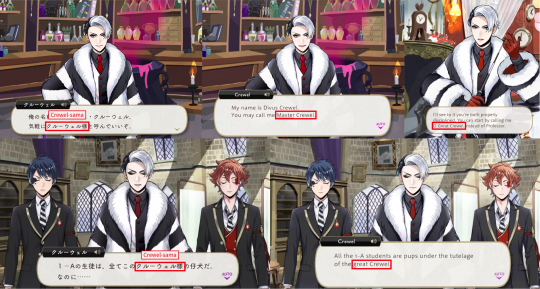
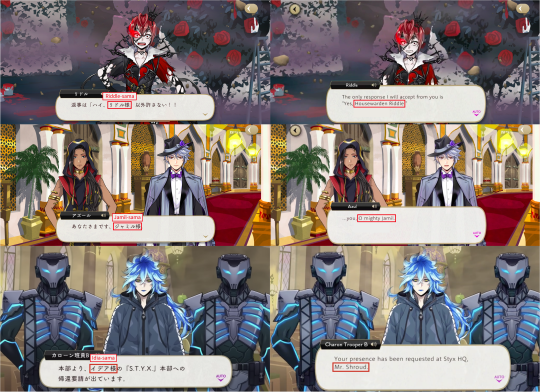
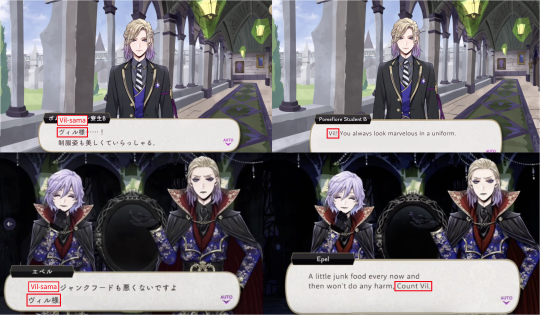
The game has an interesting relationship with the "-sama" honorific. Sebek's "Malleus-sama" gets rewritten into "Housewarden Malleus" or dropped, while it is localized as "Mr.," "Master," "O Great," "O mighty" or "Count" with other characters.
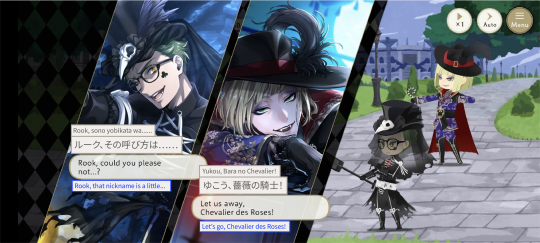
Rook's Halloween Duo dialogue is perfectly accurate! Interestingly, while Trey and Riddle both have "roses" in their nicknames, Riddle's is pronounced as the English/French word "rose," while Trey's is pronounced as the Japanese word "bara" (薔薇).
(All of Rook's nicknames (including changes made between servers) can be found here!)
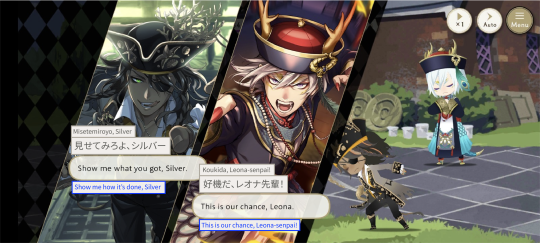
Silver's Halloween Duo is also perfectly accurate, with just the loss of "-senpai" from Silver.
Leona's line is a great example of how flexible the Japanese language is, depending so heavily on context as it does: technically all Leona is saying is the word "show," in a command form. He isn't specifying what it is that he wants Silver to show to him, so while we can infer that this would probably be "show me what you've got" or "show me how it's done," etc, in English, he could technically also be saying "show me what's in your hands" or "show me what you're hiding," etc.
(If you've ever wondered how some translations can vary so wildly between sources, this is part of why!)
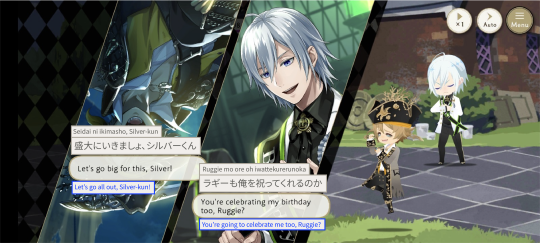
Silver's Birthday Duo is also perfectly accurate, missing only the "-kun" from Ruggie.
Unlike Cater, who also uses honorifics in 100% of his dialogue (except with Trey in important situations), when Leona overblots Ruggie doesn't shift to calling him by name: he calls him a casual form of "you," which is equally fascinating. (More here)
Also, combined the above screenshots with their corresponding audio for reference, here!
54 notes
·
View notes
Text
You know, I think part of the reason Ed doesn’t realize how shitty Calico Jack is being particularly to Stede is that Jack is using a different kind of passive aggression than they type Ed learned about with the jerks on the French Party Boat. Both Jack and the FPB people are using passive aggression by way of saying mean things but with plausible deniability, but how they create that deniability is different.
On the FPB they are all disguising their cutting remarks with politeness; the literal meaning of the words they say is neutral to positive, and it’s only from tone and other context clues that we can infer that it’s actually meant as an insult. When Gabriel says Ed has an interesting manner of eating, theoretically interesting is a positive word, but we can tell what he actually means is something closer to undignified (I think that’s probably the least charged word I could use for what he’s getting at).
Jack by contrast uses the just joking approach, where he’ll make his mean comments but in a way where he can pretend that he’s just being a bro, palling around and razing his bros. And Ed does seem to be aware that the things Jack says could be hurtful if taken the wrong way — look how quick he jumps up to assure Stede that Jack is just joking when he calls Stede “the big gal” — but it doesn’t seem to occur to him that maybe they are actually meant to be taken the wrong way. After all, how could Jack be secretly trying to say something mean when he just says the mean thing straight out like that?
#ofmd#edward teach#calico jack#(it also doesn’t seem to occur to Ed that if Jack’s ‘jokes’ are hurtful then the onus should be on Jack to stop making them#rather than on Stede and whoever else to understand he doesn’t mean it and not take it seriously#but that’s a different discussion)
53 notes
·
View notes
Text
What ever you do, don’t imagine Wild having to leave the chain for the events of totk.
Don’t imagine that it hasn’t been years between botw and totk, but only however long it’s been since he joined the chain.
Don’t imagine the chain in Wild’s hyrule when a portal appears. Don’t imagine Wild going through the portal last only to discover he can’t. Don’t imagine the rest of the chain panicking and full of confusion when the portal closes and Wild isn’t there.
Don’t imagine the confusion and panic Wild felt when he didn’t go through the portal. Don’t imagine his realization that maybe it was for a reason; for another adventure. Don’t imagine Wild going back to the castle to talk with Flora and her asking him to explore below it with her.
Don’t imagine what Wild must’ve felt seeing Fi shattered. Don’t imagine him spending every moment after that worried about what Sky would think. Don’t imagine everything he was probably feeling as he jumped after Flora, just barely missing her hand.
Don’t imagine Wild waking up alone again. Don’t imagine how in a few days he went from having the whole chain at his back, all of them being a family, to suddenly having no one. Don’t imagine his guilt at Flora falling without someone to catch her. Don’t imagine his guilt at knowing the chain has no idea what happened to him, just that he didn’t get through the portal with them.
Don’t imagine Wild stepping out onto the sky islands, desperately wanting to show Sky, going so far as to turn as if to talk with him about it only to have the crushing realization that Sky isn’t there. No one is. And he’s all alone again.
Don’t imagine Wild worrying more about everyone else than himself. Don’t imagine his desperate worrying over what happened to Flora. Don’t imagine his panic for the chain—are they eating well? Are they safe? Have they gotten hurt?
Don’t imagine him sitting at a cooking pot, spacing out thinking of everyone he’s lost, only to look back and realize he’s made way too much food for one person.
(TW: What’s next can be inferred as suicidal thoughts. Stop reading here or skip past the next little paragraphs if you do not wish to read such context)
Don’t imagine Wild being ready to give up everything, because he’s already lost so much and now he has to do it all over again and what’s the point, he’s all alone—
Don’t imagine Wild deciding not to give up because he has to find Flora first and he can’t just leave his brothers like that. He’ll find Flora, and he’ll find a way back to his brothers, and he won’t give up because he can’t. Not when he has them to find. He won’t leave them. And until then, he has the sages. He has a kingdom to protect. That’s enough to hang on to for now.
Don’t imagine Wild having to go through all the events of totk without anyone by his side through the worst of it.
Don’t imagine the relief Wild felt when he finally caught Flora.
Don’t imagine that a week after the events of totk another portal appears.
Don’t imagine Wild and Flora’s goodbye.
Don’t imagine Wild’s reunion with the chain. Don’t imagine the tears and the relief and the shouted questions and the obvious changes in Wild after every new trauma he had to endure—and the obvious difference in arm.
Don’t imagine Wild falling easily back into place as the cook. Don’t imagine Wild having a nightmare the first night back with the chain. Don’t imagine Time being the one on watch that night and comforting Wild. Don’t imagine Twilight waking up first to find the two of them sitting by the dying fire, Wild resting his head on Time’s shoulder, and deciding to let them sleep. Don’t imagine the others waking up, Twilight telling them to keep quiet, and one of them taking Wild’s slate to take a picture—the first picture they’ve taken since Wild got back.
Don’t imagine all of them around the fire one night, each sharing their own journeys.
Don’t imagine Wild telling them what happened to him in both botw and totk.
Don’t imagine how finally, after so much struggle and panic and worry and frustration, Wild is back with his family.
Or do imagine all of that. I’m not your parent, I can’t tell you what you can and can’t do. Also, it’s hypocritical of me to say don’t imagine it. I know I’ve been imagining it.
#linked universe#lu wild#lu chain#i just think they're really neat#lu sky#lu time#lu twilight#all the links#your honor i love them so much#anyways#they mean everything to me#totk#i love them#and so i hit them with the ouch stick#my favorite little guys#and then boom#emotional devastation#i swear i love them#i want them to be happy#but first this
138 notes
·
View notes
Text
just thinking about thranduil and how he categorises his life and how the events of his life affects the way he rules his kingdom…. how so much of his development was defined by huge cataclysmic tragedies… thinking about how his youth is defined as before Doriath and his adulthood is defined as After Doriath… how when he became a prince he probably held on to his more idealistic beliefs only to be sternly reminded of the fickleness of life during war….. how the entire kingdom of the woodland realm probably has a Before Dagorlad and an After. how could you not after losing your king and the majority of your people? it is incredibly telling how these events of Thranduil’s past has affected his rule and everything about him down to his parenting. he understands he’s alone. that’s tragic. but he also understands his kingdom is alone. he’s a lonely king. there's no one higher than him, no one to seek advice from. he understands he is the final defender of a kingdom and he is fighting an inherited war, he has first hand witnessed the tragedies of this war and has been directly critically affected by it, he is just as much a victim of Sauron as his people. his nobility offers him zero protection, at any point he could lose everything, and yet he remains empathetic. he remains kind. he remains generous. he obviously sees the worth in fighting, he refuses to give up fully. he is (reasonably!) incredibly cautious which some call him an isolationist or consider him fickle for, during events like his refusal of gandalf’s invitation to the White Council but it becomes incredibly clear why he is like this when it’s put into context of his past. he has trusted allies before, he has seen what has happened. to join an organisation full of ring bearer’s as the sole leader of a nation with no ring to protect his people is almost an insult. they would not and do not understand what it takes to lead in that situation. Thranduil and all of his people are living in the after of the war of the last alliance. why would they join another? Thranduil has put his people first. He recognises that they themselves are the only ones who understand just how at risk they are. and yet with all of this in mind it should noted that he allies himself with men (who historically have experienced and understand the dangerous climate of their respective nations) and creates trade routes with them to provide for his people and also provides aid to them. and it is noted in the text that Legolas has been raised incredibly happily, and he is well-adjusted. throughout fighting a seemingly losing war thranduil found it implicitly important to raise his son with joy and hope. i like to believe he understands the importance of childhood whimsy and enchantment and worked to instill and maintain his child’s innocence. he raised his son as trauma-free as he could (saying this bc we do not know if his mother is dead or sailed or not but either way to be without the mother is traumatic but besides that Legolas appears to be generally mentally healthy). despite knowing first hand just how cruel and painful life is he did not feel the need to raise his child to be prepared and worried about very real threats. rather he raised his child happily, and simply worked to give his son the skills he needed to survive and to defend himself. usually military father's who have expreienced a great deal of trauma and haven't processed it correctly tend to succumb to the urge to raise their children to understand the cruelty of the world, and loathe their children for their innocence. i think that in thranduil not doing this with legolas, we can infer that he has taken time to healthily process his experiences. I believe that Thranduil is an incredibly important figure in the Lord of the Rings because he is truly an incredible example of someone who learns from their mistakes, learns from tradegy, who learns from life. i think that Thranduil never wanted to be a King, it is a responsibility that fell into his lap unwillingly and that is why he is a successful and well-loved ruler.
#didn’t really get into the war of five army’s bc i just don’t know enough about it#but yeah#just some random thoughts i had inbetween lectures today#also the military thing comes from experience i am a military brat i Know#i can write soooo much on how Legolas’ behaviour is a direct representation of Thranduil’s character like it’s just so telling#also i personally believe that thranduil’s wife died but since that isn’t canon i didn’t include it in this but yeah i think that has a lot#to do with a Lot about him#but that’s more headcanony so i held off on diving too into it#also sorry if any of this is a bad take this is off the top of my head inbetween classes i’m not double checking things rn#thranduil#woodland realm#mirkwood#greenwood#long post#meta
299 notes
·
View notes